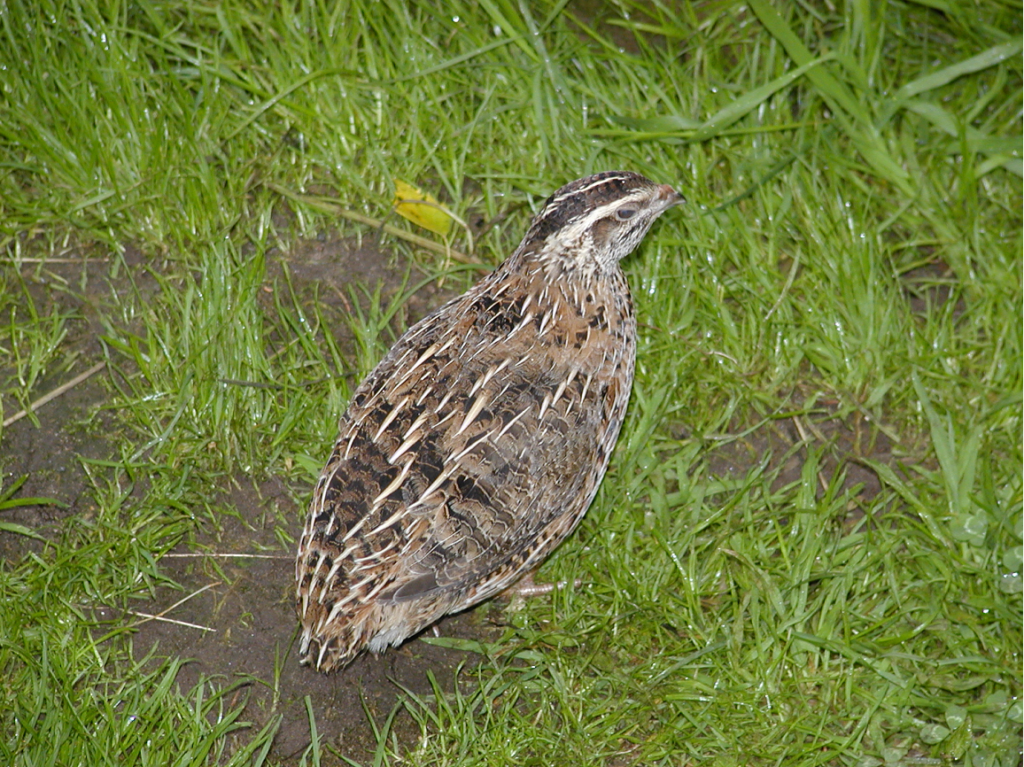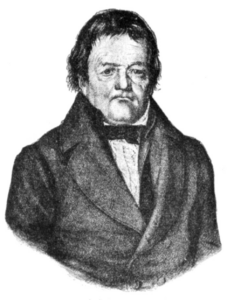The quail's call
(Poet's title: Der Wachtelschlag)
Set by Schubert:
D 742
Schubert (following Beethoven) omitted the words in italics[probably 1821 or early 1822]
Ach! mir schallt’s dorten so lieblich hervor:
Fürchte Gott!
Fürchte Gott!
Ruft mir die Wachtel ins Ohr.
Sitzend im Grünen, von Halmen umhüllt,
Mahnt sie den Horcher im Schattengefild:
Liebe Gott!
Liebe Gott!
Er ist so gütig, so mild.
Wieder bedeutet ihr hüpfender Schlag:
Lobe Gott!
Lobe Gott!
Der dich zu lohnen vermag.
Siehst du die herrlichen Früchte im Feld?
Nimm es zu Herzen, Bewohner der Welt:
Danke Gott!
Danke Gott!
Der dich ernährt und erhält.
Schreckt dich im Wetter der Herr der Natur:
Bitte Gott!
Bitte Gott!
Ruft sie, er schonet die Flur.
Machen Gefahren der Krieger dir bang,
Tröstet mich wieder der Wachtelgesang:
Traue Gott!
Traue Gott!
Sieh, er verziehet nicht lang.
Oh! it is ringing out lovingly for me over there;
Fear God!
Fear God!
The quail is calling me, striking my ear!
Sitting in the greenery, covered by blades of grass,
In the shadowy realm it urges the listener:
Love God!
Love God!
He is so gracious, so gentle.
Yet again its bouncing call signifies:
Praise God!
Praise God!
He who is able to do something worthwhile for you.
Can you see the magnificent fruit in the field?
Take it to your heart, inhabitant of the world!
Thank God!
Thank God!
He who nourishes and sustains you.
If the lord of nature terrifies you in bad weather,
Pray to God!
Pray to God!
It calls out, he looks after the meadows.
If the dangers of being a warrior make you afraid,
The quail’s call comforts me again:
Trust God!
Trust God!
Look, he will not be distant for long!
All translations into English that appear on this website, unless otherwise stated, are by Malcolm Wren. You are free to use them on condition that you acknowledge Malcolm Wren as the translator and schubertsong.uk as the source. Unless otherwise stated, the comments and essays that appear after the texts and translations are by Malcolm Wren and are © Copyright.
☙
Themes and images in this text:
Anger and other strong emotions Covers and covering Ears Fields and meadows Food, feeding and nursing Grass Green Near and far Quails Shade and shadows Storms War, battles and fighting

For recordings of the quail’s call: https://www.vogelwarte.ch/en/birds/birds-of-switzerland/common-quail and https://www.xeno-canto.org/species/Coturnix-coturnix
☙
People in France hear the call of a rooster as ‘cocorico’. In Germany the same sound is heard as ‘kikeriki’ but in Britain it is ‘cock a doodle doo’. In the case of quails, what the English hear as ‘wet my lips’ sounds to German speakers to be a pious invocation to prayer: Liebe Gott! Lobe Gott! Danke Gott! Bitte Gott! Human beings cannot avoid experiencing nature through the prism of nurture.
Although quails are wild birds (and hence they utter a truly ‘natural’ sound) their habitat is closely related to human culture and cultivation. They are at home in arable areas, taking cover in all kinds of grassland (including fields of wheat, barley and oats). It is therefore not surprising that agriculturalists, with their dependence on the weather and the soil, have associated the sounds emerging from the fields as a reminder to pay their dues to the god who provides their daily bread.
☙
Original Spelling and notes on the text Der Wachtelschlag Ach! mir schallt's dorten1 so lieblich hervor; Fürchte Gott! Fürchte Gott! Ruft mir die Wachtel in's Ohr! Sitzend im Grünen, von Halmen umhüllt, Mahnt sie den Horcher im Schattengefild: Liebe Gott! Liebe Gott! Er ist so gütig, so mild. Wieder bedeutet ihr hüpfender Schlag: Lobe Gott! Lobe Gott! Der dich zu lohnen vermag. Siehst du die herrlichen Früchte im Feld, Nimm es zu Herzen, Bewohner der Welt! Danke Gott! Danke Gott! Der dich ernährt und erhält. Schreckt dich2 im Wetter der Herr der Natur, Bitte Gott! Bitte Gott! Ruft sie, er schonet die Flur. Machen Gefahren der Krieger dir bang3, Tröstet mich wieder der Wachtelgesang: Traue Gott! Traue Gott! Sieh, er verziehet nicht lang! 1 Schubert's source appears to have been Beethoven's setting of the poem. He therefore adopted Beethoven's changes to Sauter's text. Beethoven changed Sauter's 'wie schallt's dorten so lieblich hervor' (how lovingly it is ringing out over there) to 'mir schallt's dorten so lieblich hervor' (it is ringing out so lovingly for me over there) 2 Beethoven changed 'mich' (me) to 'dich' (you) 3 Beethoven changed 'Machen Gefahren des Krieges mir bang' to 'Machen Gefahren der Krieger dir bang' (If the dangers of war make me afraid)
Confirmed by Peter Rastl with Almanach und Taschenbuch für häusliche u. gesellschaftl. Freuden. 1799. von Carl Lang mit Kupfern von D. Chodowicki, H. Guttenberg &. Heilbronn am Neckar im Industrie Comtoir, pages 250-251; and with Die sämmtlichen Gedichte des alten Dorfschulmeisters Samuel Friedrich Sauter, welcher anfänglich in Flehingen, dann in Zaisenhausen war und als Pensionär wieder in Flehingen wohnt. Mit zwei Abbildungen. Auf Kosten des Verfassers. Karlsruhe, in Commission bei Creuzbauer und Hasper. 1845.
This is the first version of Sauter’s poem. Later he published his poem in a revised form
To see an early edition of the text, go to page 158 here: https://books.google.at/books?vid=BL:A0018464116


